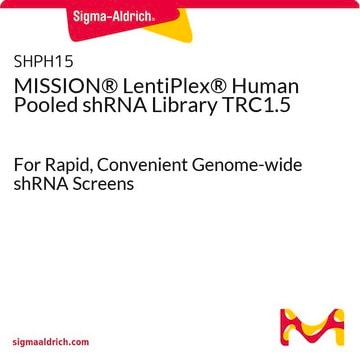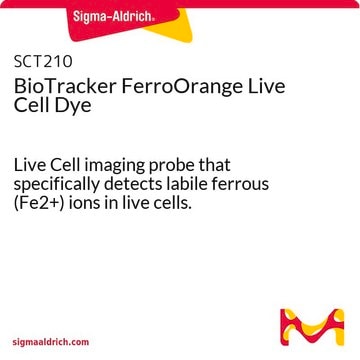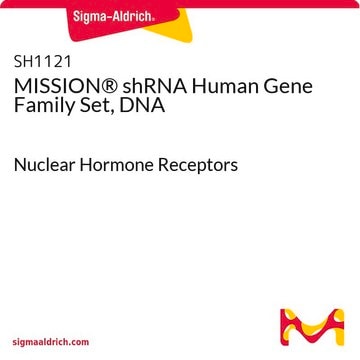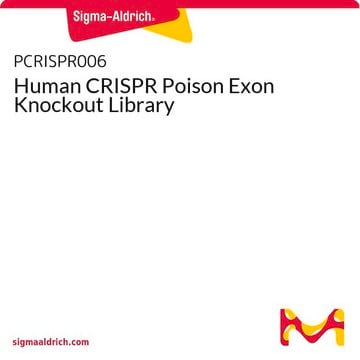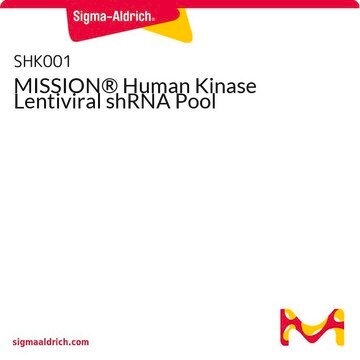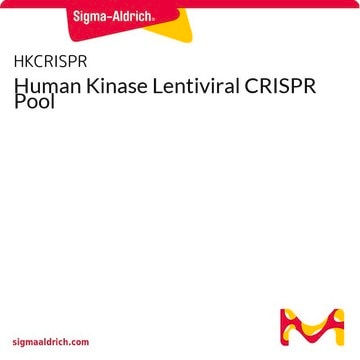SHPH01
MISSION® LentiPlex® Human Pooled shRNA Library
For Rapid, Convenient Genome-wide shRNA Screens
Synonyme(s) :
Human shRNA Library, LentiPlex shRNA Library
Se connecterpour consulter vos tarifs contractuels et ceux de votre entreprise/organisme
About This Item
Code UNSPSC :
41105904
Nomenclature NACRES :
NA.51
Produits recommandés
Gamme de produits
MISSION®
Concentration
≥5x108 VP/ml (via p24 assay)
Technique(s)
capture ELISA: 5 × 108 TU/mL using p24
Conditions d'expédition
dry ice
Température de stockage
−70°C
Description générale
MISSION LentiPlex Pooled Libraries bring the power of the MISSION TRC shRNA collection together with Sigma¢s lentiviral manufacturing expertise to enable genome-wide RNAi screens at your bench-top. The LentiPlex pooled system provides enhanced delivery and long-term gene silencing in non-dividing and primary cell lines allowing unlimited discovery potential. The convenient format now makes rapid whole-genome RNAi screens accessible to any researcher with minimal reagent, time or capital equipment investment.
The MISSION LentiPlex Human shRNA Pooled Library is a genome-wide lentiviral pool produced using a proprietary process. The library consists of over 75,000 shRNA constructs from the TRC collection targeting 15,000+ human genes. Each library is tested for shRNA representation before product release to ensure robust library coverage. The library is provided in ready-to-use lentiviral format at titers of at least 5 x 108 TU/ml via p24 assay and is pre-divided into ten subpools of approximately 8,000 shRNA constructs each. Amplification and sequencing primers are also provided for downstream target identification.
The library is pre-divided into ten subpools of approximately 8,000 shRNA constructs each. Each library is enough material for six screens at 100X representation.
Please visit sigma.com/lentiplex to learn more and see example data and uses.
The MISSION LentiPlex Human shRNA Pooled Library is a genome-wide lentiviral pool produced using a proprietary process. The library consists of over 75,000 shRNA constructs from the TRC collection targeting 15,000+ human genes. Each library is tested for shRNA representation before product release to ensure robust library coverage. The library is provided in ready-to-use lentiviral format at titers of at least 5 x 108 TU/ml via p24 assay and is pre-divided into ten subpools of approximately 8,000 shRNA constructs each. Amplification and sequencing primers are also provided for downstream target identification.
The library is pre-divided into ten subpools of approximately 8,000 shRNA constructs each. Each library is enough material for six screens at 100X representation.
Please visit sigma.com/lentiplex to learn more and see example data and uses.
Application
MISSION® LentiPlex® Human Pooled shRNA Library has been used to transfect human colon adenocarcinoma cell line HT29 for shRNA screening and bioinformatics analysis.
Autres remarques
Deconvolution of shRNA Pools
Sigma′s deconvolution service lets you easily identify the genes that impact your pooled shRNA screen.
Contact your local Sigma sales representative for more information or submit an inquiry to MISSION RNAi
Sigma′s deconvolution service lets you easily identify the genes that impact your pooled shRNA screen.
- Next-generation sequencing of clonesgives a precise number of individual clone occurrence within a pooled shRNA sample
- Comprehensive, reproducible results from pooled shRNA screens
- Statistically robust and information-rich data
Contact your local Sigma sales representative for more information or submit an inquiry to MISSION RNAi
Informations légales
LentiPlex is a registered trademark of Merck KGaA, Darmstadt, Germany
MISSION is a registered trademark of Merck KGaA, Darmstadt, Germany
Nécessaire, mais non fourni
Réf. du produit
Description
Tarif
Produit(s) apparenté(s)
Réf. du produit
Description
Tarif
Code de la classe de stockage
12 - Non Combustible Liquids
Classe de danger pour l'eau (WGK)
WGK 3
Point d'éclair (°F)
Not applicable
Point d'éclair (°C)
Not applicable
Certificats d'analyse (COA)
Recherchez un Certificats d'analyse (COA) en saisissant le numéro de lot du produit. Les numéros de lot figurent sur l'étiquette du produit après les mots "Lot" ou "Batch".
Déjà en possession de ce produit ?
Retrouvez la documentation relative aux produits que vous avez récemment achetés dans la Bibliothèque de documents.
Les clients ont également consulté
Rong Geng et al.
Chinese journal of cancer, 36(1), 63-63 (2017-08-02)
The mitogen-activated extracellular signal-regulated kinase 1/2 (MEK1/2) inhibitor trametinib has shown promising therapeutic effects on melanoma, but its efficacy on colorectal cancer (CRC) is limited. Synthetic lethality arises with a combination of two or more separate gene mutations that causes
Davide Zecchin et al.
EMBO molecular medicine, 12(8), e11987-e11987 (2020-07-17)
Triple-negative breast cancer (TNBC) has poorer prognosis compared to other types of breast cancers due to the lack of effective therapies and markers for patient stratification. Loss of PTEN tumor suppressor gene expression is a frequent event in TNBC, resulting
Xue-Cen Wang et al.
Clinical cancer research : an official journal of the American Association for Cancer Research, 25(14), 4567-4579 (2019-04-14)
Neoadjuvant chemoradiotherapy (neoCRT) is a standard treatment for locally advanced rectal cancer (LARC); however, resistance to chemoradiotherapy is one of the main obstacles to improving treatment outcomes. The goal of this study was to identify factors involved in the radioresistance
Ziyang Wang et al.
Advanced science (Weinheim, Baden-Wurttemberg, Germany), 7(17), 2000593-2000593 (2020-10-01)
Colorectal cancer (CRC) has become a predominant cancer worldwide. To understand the process of carcinogenesis, a short hairpin RNA library screening is employed to search for candidate genes that promote proliferation in the CRC cell line HT29. The candidate genes
Christine Karlsson et al.
Methods in molecular biology (Clifton, N.J.), 650, 29-43 (2010-08-06)
Identifying the genes and pathways that regulate self-renewal and differentiation in somatic stem cells is a central goal in stem cell and cancer biology. Here, we describe a method for RNAi-based screens in primary human hematopoietic stem and progenitor cells.
Notre équipe de scientifiques dispose d'une expérience dans tous les secteurs de la recherche, notamment en sciences de la vie, science des matériaux, synthèse chimique, chromatographie, analyse et dans de nombreux autres domaines..
Contacter notre Service technique
